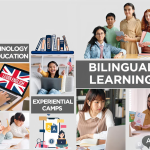Language skills developed during the early years form the foundation for later academic success, social interaction, and self-confidence. Educators increasingly recognise that play-based learning — rather than purely formal or didactic instruction — can be highly effective in supporting language acquisition, particularly for learners who are developing language (including those for whom English is an additional language).
In a Brighter Thinking Pod episode, “Early Years: play-based learning and language support”, host Jemma Joakim, Head of Early Years and Primary Curriculum at Cambridge, speaks with two guest experts from the English Modern School in Qatar: Aisha El-Sayed (KG Principal) and Aiah Elghobashy (Teaching and Learning Coordinator). They share insights from applying the Cambridge Early Years programme in real classrooms, particularly how play and language support are intertwined in young children’s learning.
Key Takeaways:
- Integrate Playful Contexts for Natural Language Exposure: Play allows children to use language in rich, spontaneous interactions — not just repeating vocabulary but practising grammar, asking questions, and negotiating meaning with peers and adults. For example, role-play, storytelling corners, or imaginative play settings encourage richer conversational turns.
- Scaffold Language Through Guided Support: Simply providing play is not enough. Educators must scaffold by modelling vocabulary, prompting children to use more complex sentences, asking open-ended questions, and helping bridge from the child’s home language or existing vocabulary. This includes repeating, expanding on children’s utterances, and gently extending language use.
- Design Play with Intention: Thoughtfully selecting and structuring play activities to target language goals is crucial. Setting up spaces where language is naturally used (e.g. dramatic play areas, interactive reading corners), planning small group play, and ensuring smooth transitions help sustain engagement and language practice.
- Support Learners of Different Linguistic Backgrounds: In multilingual classrooms, play offers opportunities for peer learning. More proficient children can model language, while home languages can be valued and gradually linked to the school or target language in playful contexts, reducing frustration and promoting confidence.
- Reflect, Monitor, and Adapt: Regular reflection on which play activities support language growth helps educators refine practice. Monitoring vocabulary, sentence complexity, and interactions allows teachers to adapt resources and scaffolding to better meet the needs of learners at different stages.

Play-based learning is not an optional “nice extra” — it is a powerful vehicle for language development in early years, particularly when matched with intentional scaffolding and awareness of learners’ linguistic backgrounds.
For educators, the challenge is to design play activities not just for fun, but with clear language learning affordances: to observe carefully and to adjust in response to what happens in the classroom. When this is done well, children are more likely to speak up, experiment with language, feel confident, and carry those early gains forward into later schooling.
For a deeper dive into the discussion, listen to the podcast here: Early Years: play-based learning and language support.
Language Learning that may be of interest:
Get a special discount by quoting code AISLMALL during CHECKOUT.
EAL Inclusive: Live English Accelerator Classes for Students

EAL Inclusive online English lessons, led by qualified teachers, help children improve proficiency for success in international schools. Personalized lessons focus on reading, writing, speaking, and listening skills, tailored to each student’s level, goals, and interests through engaging activities. Our student-centred online English lessons empower every child to improve their English proficiency and build the confidence needed to excel in an international school environment.
LingQ –Language Explorer Pass
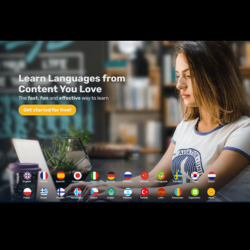
The LingQ Language Explorer Pass gives unlimited access to 20 languages, offering audio transcripts, vocabulary tools, and progress tracking. Save words, engage in live conversations, receive tutoring, and get expert writing feedback to enhance fluency and become a global citizen.
Novakid – Online English Classes For Kids
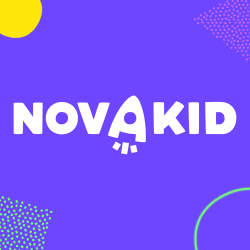
Novakid is Europe’s #1 online English school for kids aged 4-12, trusted by families worldwide. With certified native-speaking teachers, it offers interactive lessons that make learning fun and effective. Using games, activities, and full-language immersion, Novakid helps kids build confidence and English fluency. Its CEFR-based curriculum ensures real progress, while parents appreciate the blend of high-quality education and enjoyable experiences that prepare children for future success.
Oxford University Press – Oxford Reading Club (Over 1000 ebooks with audio)
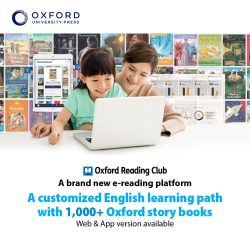
OUP is an e-reading platform with 1000+ books across 13 series of Oxford leveled readers including selected titles from Oxford Reading Tree, Oxford Bookworms, Dominoes…etc., ranging from first phonics to classic literature. It offers a smart way to read digital graded readers and improve all areas of English learning for 2-18-year-old. Supports desktop browsers, Phones and tablets.
Palfish – Live English Class 1 on 1
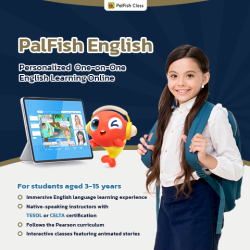
PalFish Class offers personalized online English lessons for kids, featuring Pearson-accredited content and tailored to global standards like CCSS and CEFR. With 50,000+ certified native-speaking teachers and AI-driven tools, the platform ensures engaging lessons, after-school support, and quality education.
TutorABC – TOCFL Chinese

In this exam preparation course, TutorABC selected professional and experienced teachers, with systematic teaching methods and materials, will help students master the key abilities that are needed to pass the TOCFL at all levels. Achieve results faster and conveniently with TutorABC.
Speechsquare – Language Learning
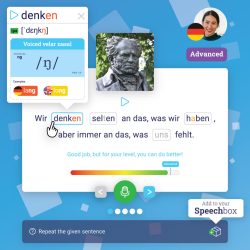
Speechsquare is an AI Speech Analytics company. We optimize the tutoring and the assessment of oral skills. Our proprietary AI allows granular analysis of speech up to the phoneme, enabling instant visual and audio feedback for the learner and powerful analysis tools for language specialists. Speechsquare is available
uTalk – Language Learning

uTalk is a language-learning app offering microlessons, games, and quizzes in over 150 languages. It helps build essential listening and speaking skills for everyday communication, available on mobile and computer. It’s used by schools globally as a reinforcement tool in language programs.


